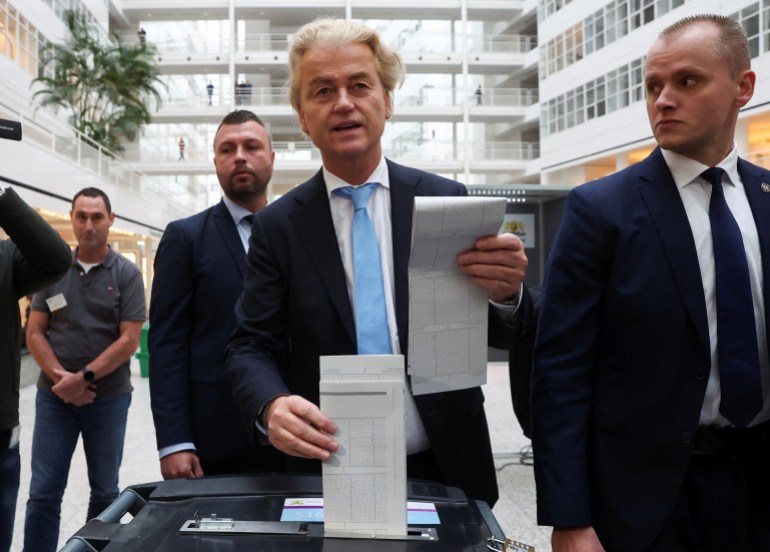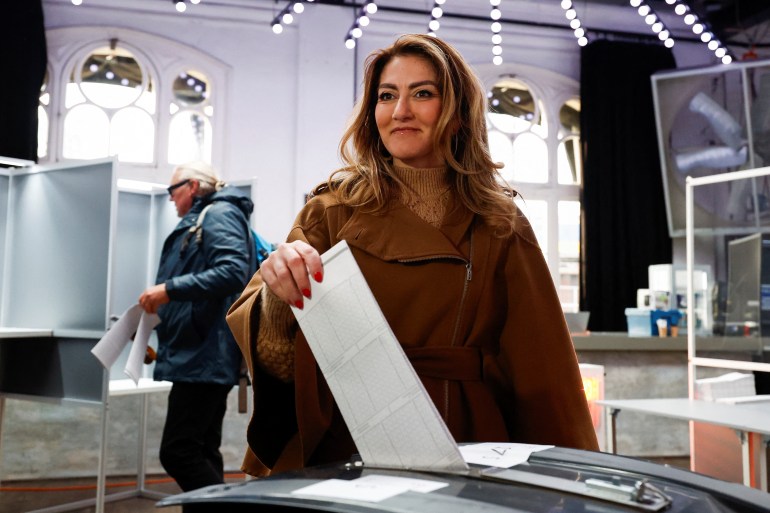Knife-edge election set to shake up Dutch politics after Prime Minister Mark Rutte’s record 13-year stint in power.
The vote is the climax of a campaign focused on issues including climate change and immigration. A poll published on the eve of Wednesday’s elections showed the conservative People’s Party for Freedom and Democracy (VVD) and anti-Islam figure Geert Wilders’s Freedom Party (PVV) tied for the lead, followed closely by a joing Labour Party and Green Left ticket.
Restricting immigration – the issue that triggered the collapse of Prime Minister Mark Rutte’s government – has been a key issue in the campaign.
“It’s been enough now. The Netherlands can’t take it anymore. We have to think about our own people first now. Borders closed. Zero asylum seekers,” Wilders said in a television debate.

Voting was taking place in polling stations including the Anne Frank and Van Gogh museums in Amsterdam, clubs, train stations and even a petting zoo.
“For me, this is a bit of a different election because anyone can win. In the end it came down to two candidates. I tossed a coin and chose one,” Vincent Spijker, a 54-year-old quality control manager, told the Agence France-Presse news agency after casting his vote.
The election will bring the Netherlands its first new prime minister in 13 years after Rutte concludes his tenure as the country’s longest-serving leader.
A poll on Tuesday showed Wilders’s party slightly ahead of Rutte’s VVD and a centre-left bloc made up of the Labour Party and Green Left, led by Labour leader Frans Timmermans.
Running to replace Rutte from his VVD is Justice Minister Dilan Yesilgoz, a Turkish immigrant who has embraced a restrictive approach to immigration but sought to differentiate herself from Wilders and is hoping to become the country’s first female prime minister.
“Maybe she can blow a new wind,” 67-year-old Maria Tolman, who voted VVD, told the Reuters news agency.
With the Netherlands a founding member of the European Union, fellow EU leaders will be scrutinising the outcome as parties on the right have suggested they would seek exemptions from the bloc’s rules on agriculture and immigration.

A self-proclaimed fan of Hungarian Prime Minister Viktor Orban, Wilders is explicitly anti-EU, urging the Netherlands to take back control of its borders, to significantly reduce its payments to the union and block the entrance of any new members.
He has also repeatedly said the Netherlands should stop providing arms to Ukraine, saying it needs the weapons to be able to defend itself. However, none of the parties he could potentially form a government with shares these ideas.
Still, a strong showing for Wilders could potentially lead the Netherlands to a hard-right coalition with a strong anti-immigration line.
“I hope I don’t wake up tomorrow and we have Wilders as a prime minister. That’s a nightmare,” Amsterdam resident Arie van der Neut told Reuters after he cast his ballot for the pro-European, centre-left Volt party.
